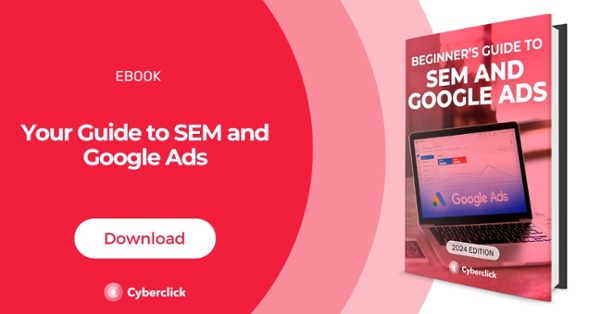- Home
- Cyberclick Academy
- SEM
- Search Engine Marketing
What Is Search Engine Marketing? Definition and Basic Concepts
SEM Content
- What Is SEM? Definition, Advantages, Disadvantages, and Key Concepts
- SEO and SEM: Definition, Differences, and Combined Use
- SEM Positioning: Definition, Characteristics, and Advantages
- What Is a SEM Campaign? Definition, Advantages, and Examples
- What Is Search Engine Marketing? Definition and Basic Concepts
- How to Create a SEM Marketing Strategy for Your Company Step by Step
- How to Set Up and Optimize SEM Campaigns on Google Ads and Their Benefits
Index
SEM, or search engine marketing, is a highly effective way to increase your ranking on search engines like Google, and attract qualified traffic to your website. Investing in SEM is a great way to grow brand awareness and increase sales.
What Is Search Engine Marketing?
Search engine marketing is all about getting your website noticed on search engines like Google. It involves using various tools, techniques, and strategies to improve your website’s visibility and increase its chances of appearing at the top of search results.
There are two main ways to achieve a high ranking in search results:
- The first is through organic results. These are determined by Google’s algorithm, which considers factors like the quality of your website’s content and how well it matches the user’s search query. Another important factor is your domain authority, which is determined by a number of different factors like the number of backlinks, the quality of your content, root domains, and more.
- The second method is through paid results. Unlike organic results, you have to pay for each click your ad gets to appear in these paid positions. You can use platforms such as Google Ads to advertise on search engines, and you can bid for advertising space and pay when someone clicks on your ad.
In practice, search marketing can be divided into techniques focused on improving organic rankings, which are referred to as search engine optimization (SEO), and those that aim to make your brand appear in paid results, which are referred to as search engine marketing (SEM). For clarity, we will use the term SEM specifically for paid search advertising.
Generally speaking, search engine marketing consists of using different tools and strategies to optimize your search engine advertising. The goal is to appear at the top of search results, attract more clicks to your website, and ultimately increase conversations. The most popular platform for SEM is Google Ads, but there are other options available, such as Microsoft Ads.
Search Engine Marketing Concepts
- Keywords: These are the terms or phrases users enter into search engines, triggering specific ads or search results. Keywords can be a single word or a combination of words, such as “buy Nike shoes” or “best accounting software.”
- Concordance: When setting up a campaign in Google Ads, you need to define the match level between the chosen keywords and the search terms users enter. This is known as concordance. A broad match displays the ad for synonyms or similar terms, while an exact match shows the ad only when the specific keyword is entered.
- Text Ad: The standard type of ad displayed in search engines. It typically includes a title, a customizable visible URL, and a brief description. Nowadays, there are various ad options, including shopping ads.
- Ad Group: In Google Ads, an ad group consists of several ads that target the same keywords. This allows you to determine which ads are most effective.
- Campaign: A campaign in Google Ads serves as an organizational structure that groups similar ad groups with common objectives. For example, if you sell school supplies online, one campaign may focus on textbooks, another on backpacks, and a third on drawing materials.
- Landing Page: The user is directed to this web page after clicking on an advertisement. To achieve good results with search engine marketing, landing pages should be optimized for conversions and encourage users to take certain actions, such as completing a form to download an ebook. The keywords, ad content, and landing page should all be aligned to ensure a good user experience.
- Search Network: This refers to the places where your ads appear. The most common option is at the top and right-hand side of the search result page, but ads can also be shown on other platforms like YouTube.
- Impressions: The number of times an ad is displayed.
- Clicks: The number of times people have clicked on an ad.
- CTR (Click-Through Rate): The percentage of clicks compared to the total impressions.
- CPC (Cost-Per-Click): The average cost incurred for each click on an ad.
- Quality score: A score assigned by Google to ads and keywords, influencing their cost per click. The score is determined based on the ad’s relevance, click-through rate, and landing page experience. This system aims for higher-quality ads with better positions and lower costs per click.
What Value Does SEM Add to Your Business?
Generates Highly Qualified Traffic
- Attracts Active Buyers: SEM enables you to attract users to your website right from the start. These people are actively searching for products or services related to your business, making them highly qualified leads.
- Builds Brand Awareness: Even if people don't click on your ad right away, seeing your brand in the search results can help build brand awareness. This can lead to more conversations in the future.
Generates Visibility
Establishes Presence in the Market: When your brand appears in the top search engine results, it associates your business with a specific need or solution in users' minds, even if they don’t click on your ad immediately. This visibility increases brand recognition and establishes your presence in the market.
Generates Conversions
- Affordable and Flexible: SEM is a flexible solution suitable for businesses of all sizes. It offers affordable minimum investment options, making it accessible to startups and small businesses. As your brand grows, you can increase the complexity of campaigns to maintain momentum.
- Pay-Per-Click Pricing: You will only pay when users click on your ads, ensuring your budget is used effectively.
Gets the Most Out of Your Budget
- Suitable for Businesses of All Sizes: One of the great advantages of search engine marketing is that it is a suitable solution for companies of all sizes since the minimum investment is very affordable.
- Scalable: If your brand is growing, you can increase the investment and complexity of your campaigns to keep up your momentum.
- Measurable Results: SEM platforms like Google Ads provide detailed campaign metrics that allow you to track and analyze performance. This enables you to make data-driven decisions, optimize your campaigns, and achieve better results over time.
By leveraging the potential of SEM, your business can achieve its goals quickly and scale effectively. If you are looking to harness the benefits of search engine marketing for your brand, feel free to contact us! We would be happy to discuss your needs and help you create a SEM campaign that will bring you closer to achieving your goals.
Data Scientist at Cyberclick. PhD in Astrophysics from the University of Barcelona with more than ten years of research experience through data analysis and interpretation. In 2019 he redirected his professional career to the world of Data Science by graduating in Data Science and Big Data from the UB, as well as participating in the Science To Data Science (S2DS) program in London. He is currently part of Cyberclick's Data Science and SEM team.
Recursos para seguir aprendiendo: ebooks, vídeos y cursos

Cyberclick

Cyberclick

Cyberclick

Cyberclick

Cyberclick



